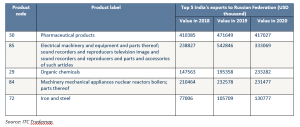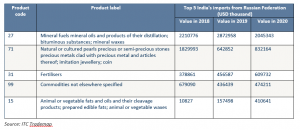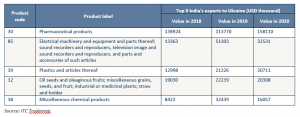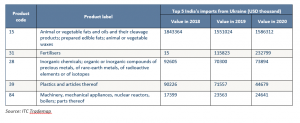
Ukraine conflict and India’s trade: The Russian invasion of Ukraine will have huge geopolitical implications that could alter power equations across the world. The US and NATO are unlikely to allow this conflict to escalate into a full-scale war and have imposed sanctions against Russia that could have repercussions for the global economy. The conflict will have a damning effect on many emerging markets that are importers of crude oil. Global crude prices have shot through the roof, putting inflationary pressures on emerging market economies like India. India is already witnessing high inflation that threatens to upset the fragile economic recovery from the Covid-19 pandemic.
While the economic sanctions are unlikely to end the war, they will have an immediate impact on global trade, capital flows, technology transfer, and financial markets. Global trade will be the biggest victim of the conflict. The US is likely to threaten to impose sanctions on nations trading with Russia. This could lead to supply chain disruptions, affecting several industries across the world.
READ I Russia may pay a price for Putin’s Ukraine misadventure
Ukraine conflict impact on India’s trade
India has strong bilateral trade ties with both Russia and Ukraine. So, the military conflict will have economic implications for India. Russia is India’s 25th largest trading partner. The bilateral trade stood at $9.4 billion this fiscal year compared with $8.1 billion last year. Indian exports to Russia include pharmaceuticals, organic chemicals, electrical machinery, vehicles, and tea. Its major imports from Russia are fuels, mineral oils, boilers, nuclear reactors, electrical machinery, mechanical appliances, fertilisers, pearls, and precious/semi-precious stones.


India is the fifth-largest export destination of Ukraine and stands among the largest in the Asia-Pacific region. The bilateral trade with Ukraine stood at $2.5 billion in 2019-20 and $2.3 billion so far in this fiscal. Main export items from India are pharmaceutical products, mechanical appliances, machinery, chemicals, oilseeds, fruits, coffee, tea, and spices. India’s major imports are agriculture products, metallurgical products, plastics, and polymers.
READ I Russian invasion of Ukraine: Implications for Indian economy


Pharmaceuticals are a major export item from India to Ukraine. In value terms, pharma exports stood at $181 million in FY 21, recording 44% growth over the previous year. After Germany and France, India is the third-largest exporter of pharmaceutical products to Ukraine. Several Indian pharmaceutical companies like Ranbaxy, Dr Reddy’s and Sun Pharma have their presence in Ukraine. Most of these companies have their representative offices as well as an office of Indian Pharmaceutical Manufacturers’ Association (IPMA). The Russia-Ukraine war as well as the sanctions imposed on Russia by western countries may hit India’s pharmaceutical exports.
India imports 80% of its crude oil requirements. The war will put huge pressure on India’s import bill, impacting the exchange value of the rupee. Another major impact will be on the tea exports of India. Russia is one of the largest buyers of Indian tea, accounting for 18% of India’s tea shipments. According to the provisional data of the Tea Board, the country’s exporters have shipped 30.89 million kg of tea to Russia during January-November 2021. The war will impact the shipments through higher freight rates and logistics cost, pushing the cost of operation for Indian planters. In addition, it can also create the situation of oversupply in the domestic market and a dip in prices.
The geopolitical tension at a time when the world economy is struggling to recover from the debilitating blow of the Covid-19 pandemic will further prolong the recovery process. To cushion the negative impact of the war in sectors that are at high risk, India needs to find newer markets. The future will now depend on what Russia will do and the consequences of its actions on global trade and investments.
(Dr Javeria Maryam is an associate, public policy and research, at Shangrila Corporate Services. Angana Parashar Sharma is a doctoral scholar at the Department of Economics and Finance, BITS Pilani.)

